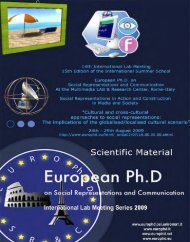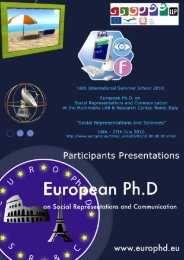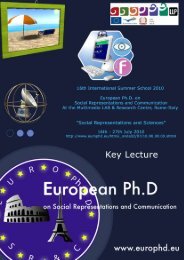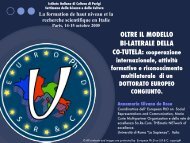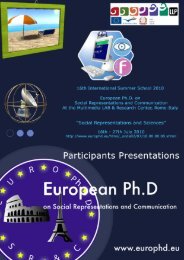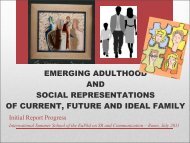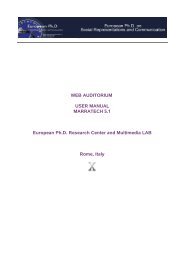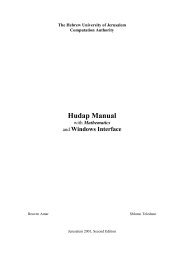The "boomerang" effect of the radicalism in discourse analysis
The "boomerang" effect of the radicalism in discourse analysis
The "boomerang" effect of the radicalism in discourse analysis
You also want an ePaper? Increase the reach of your titles
YUMPU automatically turns print PDFs into web optimized ePapers that Google loves.
Although <strong>the</strong> role <strong>of</strong> <strong>the</strong> action and <strong>of</strong> <strong>the</strong> social practices cannot be denied <strong>in</strong> <strong>the</strong><br />
construction <strong>of</strong> semantic scenarios for our representations <strong>of</strong> <strong>the</strong> world, once aga<strong>in</strong><br />
radical antimentalism and <strong>the</strong> pragmatic reductionism <strong>of</strong> <strong>the</strong> RDA generates several<br />
<strong>in</strong>conveniences. <strong>The</strong> action does not expla<strong>in</strong> everyth<strong>in</strong>g.<br />
It is certa<strong>in</strong>ly possible to br<strong>in</strong>g back a representation to <strong>the</strong> social and cultural<br />
practices already given, as is highlighted <strong>in</strong> <strong>the</strong> TRS which - as mentioned - articulates<br />
levels and construction<br />
“(...) I have not started from <strong>the</strong> <strong>in</strong>dividual, or ra<strong>the</strong>r cognitive, representations. And because I do not<br />
believe that, by association, by relationships or statistical diffusion, <strong>the</strong>se may generate a coherent and<br />
stable social representation. In <strong>effect</strong> , this is a fact <strong>of</strong> <strong>in</strong>stitution, <strong>of</strong> prescribed and regulated<br />
communication. Fundamentally, as Gellner wrote: "we th<strong>in</strong>k what we must th<strong>in</strong>k”. Our culture th<strong>in</strong>ks <strong>in</strong><br />
us. Both conceptually and verbally we are exceptionally well prepared.”<br />
(Moscovici, 1999, p. 223, my translation)<br />
It is, however, hard to ma<strong>in</strong>ta<strong>in</strong> that <strong>the</strong> social representation does not itself perform a<br />
role <strong>in</strong> orient<strong>in</strong>g <strong>the</strong> action and that this role is not merely re-producer (<strong>the</strong><br />
representation as mnemonic repertoire <strong>of</strong> <strong>in</strong>teriorised social practices reflected <strong>in</strong> it), but<br />
at times <strong>in</strong>novator <strong>in</strong> relational contexts. <strong>The</strong>se contexts are certa<strong>in</strong>ly regulated by<br />
normative systems <strong>of</strong> expectations, social prescriptions, etc., yet are also possible<br />
scenarios <strong>of</strong> change. <strong>The</strong> action produced <strong>in</strong> a present relational context is also<br />
evocation <strong>of</strong> actions previously performed (and <strong>of</strong> <strong>discourse</strong>s spoken), but may also<br />
modify <strong>the</strong> scripts <strong>of</strong> <strong>the</strong> past, <strong>in</strong>troduc<strong>in</strong>g new repertoires thanks to <strong>the</strong> anticipat<strong>in</strong>g<br />
representation <strong>of</strong> <strong>the</strong> events (all th<strong>in</strong>gs told, <strong>the</strong> language itself is a dynamic fact and <strong>the</strong><br />
element at <strong>the</strong> same time more stable and more chang<strong>in</strong>g <strong>of</strong> a culture).<br />
“One could say, follow<strong>in</strong>g Rommetveit 1974), that ord<strong>in</strong>ary language provides us with culturally and<br />
socially transmitted drafts <strong>of</strong> contracts. We categorize states <strong>of</strong> affairs with<strong>in</strong> <strong>the</strong> multifaceted social<br />
world and optionally elaborate and realize <strong>the</strong>se draft <strong>of</strong> contracts. Commmunicative genres, like social<br />
representations, are only partialy determ<strong>in</strong>ed, allow<strong>in</strong>g <strong>the</strong>m, <strong>in</strong> each situation, to be modified, created and<br />
re-created.”<br />
(Markova, 2000, p. 456)<br />
In <strong>the</strong> absence <strong>of</strong> every pre-given entity, ano<strong>the</strong>r aspect that risks be<strong>in</strong>g phagocytized<br />
<strong>in</strong> <strong>the</strong> “discursive imperialism” <strong>of</strong> <strong>the</strong> RDA is, <strong>the</strong>refore, <strong>the</strong> temporal dimension (i.e.,<br />
<strong>the</strong> role <strong>of</strong> <strong>the</strong> past <strong>in</strong> orient<strong>in</strong>g <strong>the</strong> practices and <strong>the</strong> cont<strong>in</strong>gent <strong>discourse</strong>s, but also <strong>the</strong><br />
role <strong>of</strong> <strong>the</strong> future). <strong>The</strong> <strong>in</strong>dividual can be considered a "position" <strong>in</strong> a cont<strong>in</strong>gent<br />
argumentative context, but <strong>the</strong> <strong>discourse</strong>s spoken <strong>in</strong> <strong>the</strong> past or those imag<strong>in</strong>ed and<br />
projected <strong>in</strong>to <strong>the</strong> future (were <strong>the</strong>y only reduced to argumentative roles played as<br />
characters <strong>in</strong> search <strong>of</strong> an author) <strong>in</strong>fluence on <strong>the</strong> <strong>discourse</strong>s or l<strong>in</strong>guistic games <strong>in</strong> <strong>the</strong><br />
present. It is hard not to consider <strong>the</strong> role <strong>of</strong> <strong>the</strong> memory, both personal and collective,<br />
<strong>in</strong> produc<strong>in</strong>g <strong>in</strong>teriorised repertoires <strong>of</strong> scripts that orient <strong>the</strong> present action and <strong>the</strong> role<br />
<strong>of</strong> <strong>the</strong> imag<strong>in</strong>ation <strong>in</strong> chang<strong>in</strong>g <strong>the</strong> registers <strong>of</strong> <strong>discourse</strong>-actions (we know how much<br />
this has been true also <strong>in</strong> <strong>the</strong> logic <strong>of</strong> scientific discoveries).<br />
Accord<strong>in</strong>g to <strong>the</strong> RDA, <strong>the</strong> SRT would be characterised by scanty attention towards<br />
<strong>the</strong> constructive role <strong>of</strong> <strong>the</strong> <strong>discourse</strong> and <strong>of</strong> <strong>the</strong> social practices. This criticism seems<br />
unmotivated for a series <strong>of</strong> reasons. <strong>The</strong> <strong>the</strong>ory <strong>of</strong> social representations (SRT) and<br />
<strong>discourse</strong> <strong>analysis</strong> (DA) are both focused to a large extent on <strong>the</strong> study and <strong>analysis</strong> <strong>of</strong><br />
35




